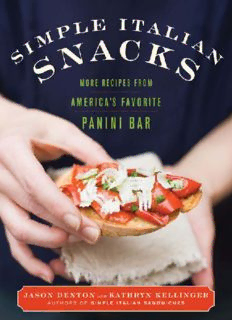
Simple Italian Snacks: More Recipes from America's Favorite Panini Bar PDF
Preview Simple Italian Snacks: More Recipes from America's Favorite Panini Bar
S I M P L E I T A L I A N s n a c k s M O R E R E C I P E S F R O M A M E R I C A ’ S F A V O R I T E P A N I N I B A R jason denton and kathryn kellinger photography by michael piazza To my amazing wife, Jennifer, and my two little dudes, Jack and Finn, I love you —Jason Denton For Kay and George and all that took place in the kitchen —Kathryn Kellinger c o n t e n t s introduction | 1 1 aperitivo—drinks with friends 4 8 backyard bocce 2 tournament 90 new year’s day 14 9 3 lunch by the pool fireside snacks 28 104 4 10 ski snacks 42 prosecco party 120 5 11 in famiglia—dinner merende— at home 52 late-afternoon lunch 130 6 12 autostrada—picnic lunch 66 world cup final 142 7 13 pizza 78 antipasti 156 acknowledgments | 175 index | 177 About the Authors Other Books by Jason Denton and Kathryn Kellinger Credits Cover Copyright About the Publisher i n t r o d u c t i o n Breakfast, lunch, and dinner all have their merits—books have been writ- ten, families raised, and important business conducted over all of these meals. But for my family and me, most of our meals are built from snacks; delicious ingredients arranged into an assortment of small plates. Lively, fun, and sophisticated, these snacks are born from the union of the Italian tradition of antipasti and the modern American lifestyle. The pace at the table is leisurely, and the time spent in the kitchen is just as relaxed. Small plates, bar snacks, antipasti, and tapas—these are familiar terms to most of the American restaurant-going public. Social and styl- ish, this type of cuisine is the basis for my weekends with friends and family, midweek nights at home with the neighbors, or just the kids on a Sunday morning. Like everybody else, I don’t have the time to make elaborate meals—I save that for holidays. But we do a lot of entertaining all year long, and this is the food that makes it possible. Beside the ease of advance preparation, the prolonged nibbling of snacks and small plates is conducive to extended conversation and elongated lounging— both of which should be national pastimes. 1 introduction | The Italian custom of antipasti has gained popularity in restaurants recently (even though it existed in medieval times) with broad tables of small plates to entice the guests as they enter, offering something to nibble on while considering the rest of the meal. The food I serve at my restaurants—’ino, Lupa, ’inotecca, and Bar Milano—is made and served in the tradition of Italian conviviality. The dishes in this book have been road tested—these are the ones my friends love and look for when they arrive for a summer weekend or an afternoon of football. The chapters in this book are based on occasions: time spent with friends and family and what you might serve them. Each chapter lists a selection of items that are especially suited to, say, having friends over, casual picnics, or serving a sit-down dinner. Seasons come into play mostly in spirit, but occasionally the fleeting availability of an ingredi- ent like figs or corn dictates a snack that celebrates the season. Panini, tramezzini, and bruschetta continue to be major players in our home entertaining. In Simple Italian Sandwiches I highlighted many of the classic combinations—the iconic sandwiches of Italy. I’ve added more here, but I’ve focused on regional combinations such as a panini of speck, cabbage, and poppy seeds (page 138), flavors that you might find in the northern Alpine region of Italy. Or I have featured what I consider an Italian approach to worldwide ingredients, like the Tramezzini of Duck Confit Salad with Pickled Squash Mayonnaise (page 100). This type of snacking continues to be inspiring—the combination of simplicity and endless possibilities is what Simple Italian Snacks hopes to embody. Use the occasions as a starting point, and then compose your menus based on your own style and preferences. What all of these snacks share 2 | simple italian snacks
Description: